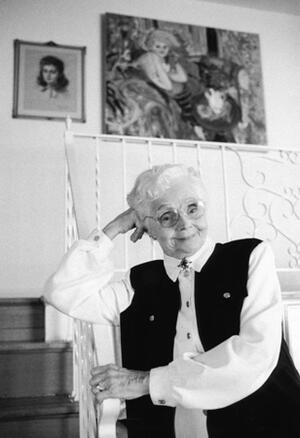Vivienne Shub
Encouraged by her father's sense of drama in storytelling and advice to follow her passion, Vivienne Shub became an actress. Born in Baltimore during the deadly flu epidemic of 1918, Vivienne attended music classes in her youth at the Peabody Conservatory. She frequented local theaters before enrolling in full-time acting classes at the Ramsey Street Theater Conservatory. After an unsuccessful attempt to find an acting job in New York, Vivienne returned to business school in Baltimore and supported herself in secretarial jobs while acting on the side. In 1941, she married Louis Shub, a concert pianist, and had three children, Amy, Daniel, and Judith. Active in various progressive political causes, the family supported the civil rights movement and protested the Vietnam War. In 1963, Vivienne helped to create Center Stage, bringing a regional professional repertory theater to Baltimore. In the 1970s, she and her husband took up residency at Goucher College, sharing their expertise in music and theater. Vivienne has also enjoyed a long teaching career at Towson University, appeared in numerous films, and serves as president of the Baltimore Theater Alliance. Vivienne continues to be passionately dedicated to the theater and her profession as an actress, performing at Everyman Theater, where she is a resident company member.
Vivienne details her family background and heritage. She says she grew up with a passion for social issues inherited from her parents. Her mother's family were social activists in Russia. Vivienne's mother was sent to Baltimore to learn sewing and join her family in the States. She talks about her father's immigration experience, education in the United States, working in a factory, forming a union, learning to speak English, and eventually becoming a dentist. Vivienne's parents met in a poetry club. Vivienne was born during the 1918 flu epidemic. She shares memories of her childhood, the neighborhood she grew up in, and her musical and political involvement during high school. During the Great Depression, Vivienne's mother became politically active in addressing hunger, unemployment, and veterans' benefits. Vivienne explains that her father significantly influenced her to become an actress. He was a wonderful storyteller, and her parents were very encouraging of Vivienne's interest in theater and becoming an actor. Vivienne studied to be a teacher at Towson college and spent a summer at the Ramsey Street Theater Conservatory. She recalls her struggles trying to make it as an actress in New York City. Eventually, Vivienne went to business school and juggled office work with stage and radio acting. She tells the story of meeting her husband, Louis Shub, and talks about his career and Progressive Party Activism. When Louis was drafted in World War II, Vivienne moved in with her parents and continued acting until her children were born. In 1963, Vivienne founded Center Stage to bring a professional repertory theater to Baltimore. Vivienne continued to be involved in the cultural and political movements of the 1960s, such as the Civil Rights Movement. Vivienne also shares her love of Jewish and Yiddish culture, theater, and tradition. Finally, Vivienne reflects on changes in the Baltimore Jewish communities, raising children, her career in acting and teaching at Towson University, Yiddishkeit, and losing her husband. Topics also include child labor laws, antisemitism, Federal Theater Project, the 1986 presidential campaign, and the Progressive Party.



